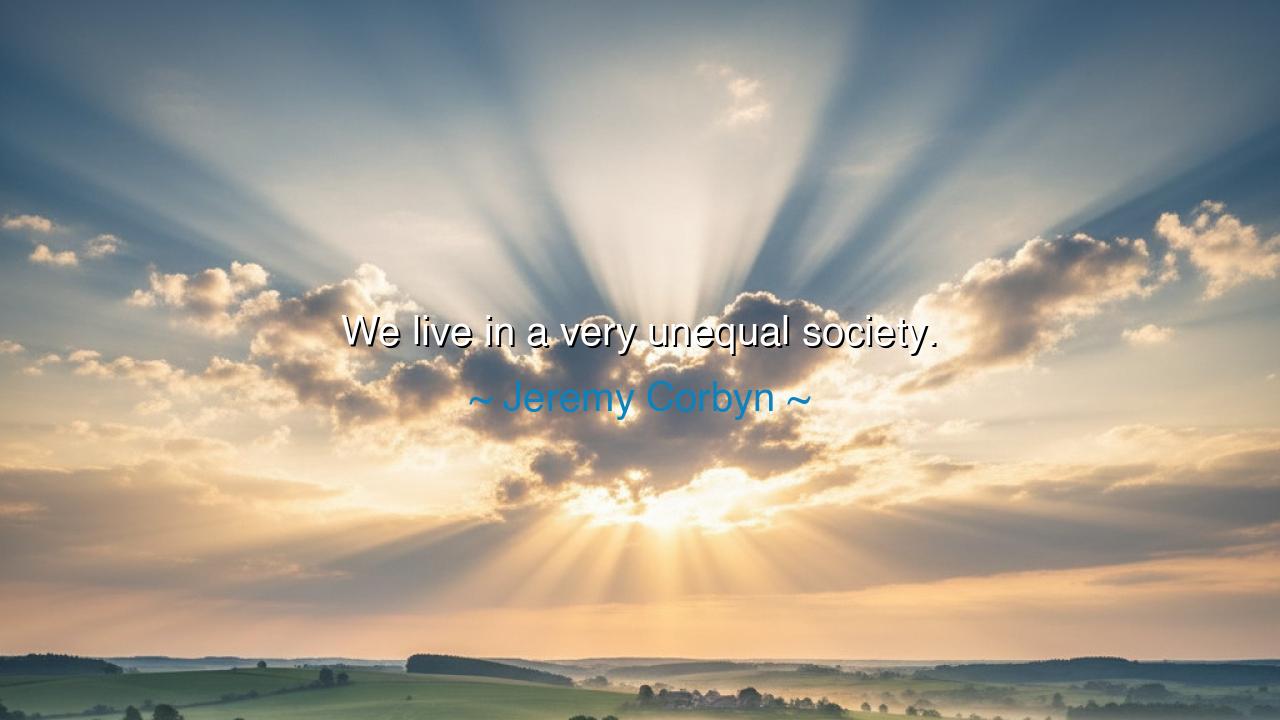
We live in a very unequal society.






Hear the words of Jeremy Corbyn, plain yet thunderous in their simplicity: “We live in a very unequal society.” Do not mistake their brevity for weakness; for like the chisel that cracks stone, these words strike at the foundation of the world we inhabit. In them lies an ancient truth—that mankind has always struggled with the gulf between those who feast and those who hunger, between those who rule and those who toil. The phrase is simple, but the weight it carries is heavy, for an unequal society is not merely unfair; it is unstable, dangerous, and unworthy of the dignity of humankind.
What does it mean to dwell in an unequal society? It means that a child’s future is written not in their spirit, but in the wealth of their birth. It means that comfort is hoarded by a few, while many sweat and suffer to survive. It means that while some live in palaces, others sleep in streets. Inequality is not only in coin but in power, in opportunity, in whose voice is heard and whose voice is silenced. Corbyn’s lament is not new, but it is urgent, echoing the cries of prophets through the ages who denounced the vanity of kings and the neglect of the poor.
Consider the story of the French Revolution. For years, the nobility and clergy lived in splendor, while peasants starved under crushing taxes and bread shortages. The cry of “Liberté, Égalité, Fraternité” arose not out of idle philosophy, but from the burning anger of those who could no longer endure the chains of an unequal society. The Bastille fell, and with it the illusion that vast inequality could stand forever unchallenged. The lesson of France was written in blood: where inequality festers, upheaval is inevitable.
Or recall the civil rights movement in America. For generations, Black men and women endured the oppression of segregation, their opportunities denied, their dignity stripped. The marches, the sit-ins, the fiery sermons of leaders like Martin Luther King Jr. were born of the simple truth that justice cannot breathe in an unequal society. Though progress came, it was purchased with suffering and sacrifice. The lesson here is the same: when a people are denied equality, their resistance becomes the spark that reshapes nations.
The wisdom of Corbyn’s words lies in their ability to pierce through excuses. Many cloak inequality with fine names—“competition,” “freedom of the market,” “tradition.” Yet beneath these garments, the truth remains naked: injustice persists. And injustice tolerated becomes injustice justified. Thus, the reminder that “we live in a very unequal society” is both diagnosis and warning, a call for awakening.
The lesson for us is clear: we must not grow numb to inequality. We must not accept it as the natural order, for no child is born to deserve less, no worker is destined to starve while others profit from their labor. A just society does not demand sameness, but it demands fairness. It demands that no one is crushed by the weight of another’s greed, and that opportunity is not the privilege of a few, but the inheritance of all.
Therefore, O listener, let your actions be these: open your eyes to the suffering around you, do not turn away. Speak against injustice even when your voice trembles. Share of your abundance, and demand of leaders that they serve not only the powerful, but the powerless. Build communities where cooperation triumphs over competition, where compassion is stronger than greed. For though we live now in an unequal society, the future is not yet written—and the hands that can write it anew are our own.






AAdministratorAdministrator
Welcome, honored guests. Please leave a comment, we will respond soon